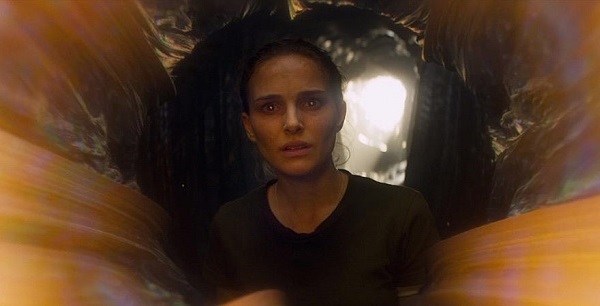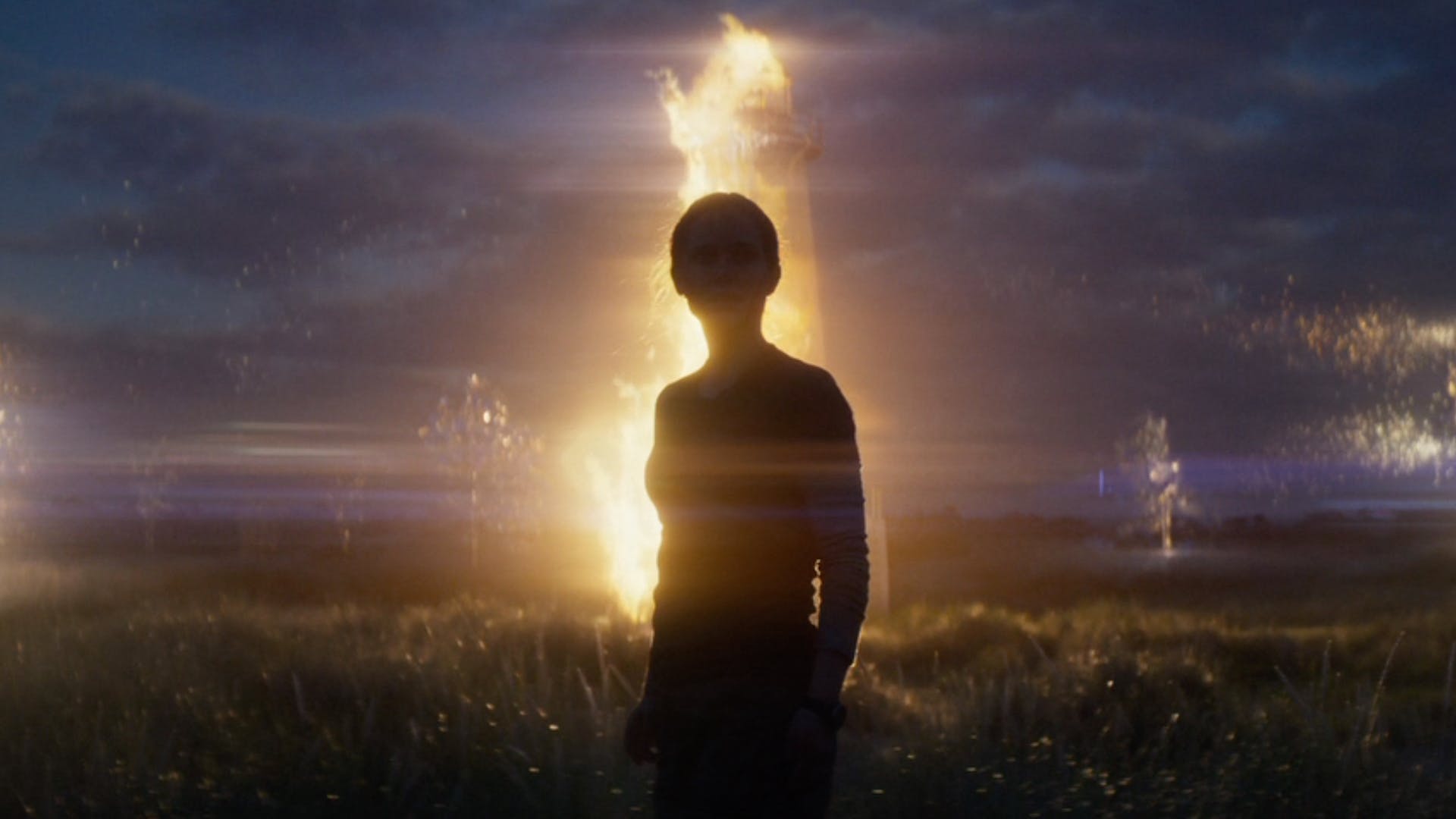5. The excellent ensemble cast

Led by Natalie Portman, the first-rate ensemble players and the apprehensive characters they portray is certainly a large part of what makes Annihilation effective. The largely female cast (more on the importance and audacity of that later on down this list), a rarity in this type of genre film, are a diverse lot: Dr. Ventress (Jennifer Jason Leigh), a psychologist and the team’s leader, she is also dying from cancer, paramedic Anya Thorensen (Gina Rodriguez), who struggles with substance abuse, anthropologist Cass Sheppard (Tuva Novotny), who is mourning the death of her daughter, and physicist Josie Redek (Tessa Thompson), who fights with depression and her own suicidal thoughts.
Lena (Portman), is a John Hopkins biology professor and Army veteran, she’s drawn to the group after her husband, Kane (Oscar Isaac) an elite serviceman, inexplicably returns from the Shimmer after a nearly year long absence wherein he was presumed dead. His reappearance has complications that draw Lena to Area X, and to Dr. Ventress specifically.
There’s more to the team, of course, and there’s more than a little apprehension as to who might be withholding information or manipulating the others, and so forth. And while there will be no spoilers here in those regards, lets just say that what may at first feel like some broad strokes and familiar character tropes are given refreshing changes, enigmatic deviations, and enough ample bitterness, and palpable sadness to make it all quite compelling.
4. A rare vision of women in charge

As illustrated in the point above regarding the strong female-led cast, Annihilation goes a lot further with its kickass team of female adventurers. Not only does the group exploring the Shimmer feature two women of color, but Rodriguez’s Anya is also a queer character.
As with VanderMeer’s book, Garland’s film risks alienating mainstream appeal by having female leads in what, at least on the surface, appears to have the premise of a sci-fi action film (aka “a guy movie”). But Predator this is not.
A smart, slick, and cerebral fantasy film with multiple female AND women-of-color leads, and yet the studio still dumped it to streaming giant Netflix rather than give it the proper theatrical release it deserves. (Interjection: thankfully I live in Canada, where it was released theatrically, and both screenings I attended drew large and appreciative crowds).
You’d think, at a time when the biggest blockbuster franchises show many female-led projects (Wonder Woman is the obvious one, but The Last Jedi featured a wealth of women leading the charge and kicking some serious butt, Mad Max: Fury Road is still a rosy visage in everyone’s rearview, and Black Widow, and Captain Marvel films haunt the horizon), that Paramount would have a better grasp of what intelligent adult audiences crave. You’d think that, but you’d be sorely mistaken.
Rather than continue the now stale debate about strong females leading these kinds of genre films, at least the critical and audience reaction to Annihilation has been largely excited and overall glowing. Give us smart films, give us sophisticated female leads, and give us a film we can think about and discuss for days afterwards. Annihilation does just that and then some.
3. The extended climax and ambiguous ending

The mounting emotional and mental strain of Annihilation reaches a fever pitch in the final third of the film, and it is here that Garland largely eschews VanderMeer’s poignant prose and takes his own legitimate and largely successful stabs at greatness.
Here is a brief description of the extended climax, and though it is spoiler-filled, we do take pains not to reveal everything; Lena finds the lighthouse and a clue to Kane’s fate, a fate that involves a shocking self-immolation courtesy of a flash grenade and also the appearance of a doppelgänger. But Lena’s discoveries do not end there.
Next she enters a subterranean passageway where she finds the remaining survivor of her party succumbing to the Shimmer and seeming to be absorbed by it. There’s something rather doppelgänger-y about this fate, too, as the Shimmer seems to be changing form and absorbing Lena’s colleague.
Lena makes to escape, setting the passageway and the lighthouse on fire as the Shimmer begins to imitate her. This sequence is one of the most frightening in the film as an utterly alien humanoid form mirrors Lena’s every move, ultimately hoping to hide, as her, without jettisoning its otherness.
While this sequence is not in the novel (though discourse on mirroring and hiding in plain sight, is), it certainly is reflective of the feel of the novel. As is the closing scene where Lena’s deeply persona and penetrative story about her marriage and her husband’s fate. The two of them are together, having survived something utterly alien, completely life-altering, not unlike a near-death experience. Lena and Kane embrace and she asks: “You’re not Kane, are you?” His answer is one we fear when he responds, “No. I don’t think so. Are you Lena?”
People who’ve crawled through trauma never come out the other end at all the same, and so this ending, steeped in ambiguity as it is, does make a certain, heart-rending sense. Annihilation is irrevocable, and the fate we all share. It makes sense to cling together, even if we’re unsure, because we’re all that we have.
2. For all of its narrative puzzles, Annihilation endures as a challenging and unforgettable film

By blending messy, suggestive drama with polished conceptual art, Garland has, as with Ex Machina before it, given impetus to Annihilation. From the film’s alarming opening moments and the reveal that much of what we will witness will be one extended flashback, to Lena, a protagonist whose grief may be most discernible and rawly exposed, but isn’t an easy person to like, Garland routinely fractures time along with audience expectations.
And just as Lena is certain when she tells Lomax (Benedict Wong) that two of her colleagues are dead, the other two she’s unsure about, so to is the viewer unsure about all that has played out before us. Lena’s confusion is as fraught as it is fearful, and this generates our own fascination and uncertainty.
Garland’s Annihilation is, make no mistake, a dense and unyielding thriller where the viewer cannot remain passive but must engage with it. Often these types of grandiose sci-fi films are over explained and verge on the didactic (Christopher Nolan, anyone?), but Annihilation deliberately obfuscates as it unravels.
Sure, such actions are bound to infuriate perhaps as many people as it floors, and with so many audacious and oddball choices, this is destined to be a love-it-or-hate-it cryptogram. And certainly Annihilation will stick with a lot of viewers, eddying and flashing in their thoughts like a semi-precious stone.
1. In Alex Garland’s own words

“For me, [Annihilation] was a film about the nature of self-destruction… it was about an observation I made, which is that everybody appears to be self-destructive. Some people are very obviously self-destructive because they’re addicted to heroin or alcohol or they act in a psychotic way or whatever, and they offer their self-destruction to you. Other people are very comfortable in their own skin, and they’ve got a fantastic job and a fantastic life and everything seems to be bulletproof. They feel like they’ve sort of cracked something about life. But then when you get to know them, you discover odd bits of self-destruction, which then become significant bits of self-destruction. It was the universality of it, that even the people who’d cracked it all had not cracked it all. And then I started trying to think… Where does it come from? Why is it that you have a really good marriage and you dismantle it? Why do you have a really good friendship and you dismantle it? Why do you have a really good job and you dismantle it? Whatever it happens to be. And the film essentially presents that question and an answer to that question by inference. To me, that is what it’s about.”
– Alex Garland (in a recent interview with Slash Film’s Ben Pearson)
Author Bio: Shane Scott-Travis is a film critic, screenwriter, comic book author/illustrator and cineaste. Currently residing in Vancouver, Canada, Shane can often be found at the cinema, the dog park, or off in a corner someplace, paraphrasing Groucho Marx. Follow Shane on Twitter @ShaneScottravis.